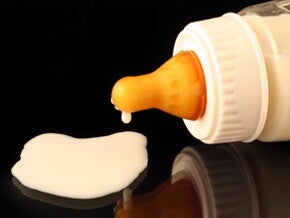
Reflux In Infants: Symptoms, Treatments And Management Tips
What Mothers Need To Know About Acid Reflux In Babies!
Acid reflux or GERD refers to the backward flow of milk and acid stomach contents to the esophagus. It is usually caused by the underdeveloped sphincter separating between the stomach and the esophagus.
Acid reflux is a very common condition among infants. It often hits the healthy ones and those who have no visible medical problem.
In the following article, we will tackle details regarding the symptoms of acid reflux, and how to diagnose it, treat it and manage it…
In general, acid reflux hit babies during their first 3 months with moderate symptoms ranging between spitting, vomiting, coughing, mood swings, less feeding than usual and bloody stools. But, babies manage to overcome these symptoms on their own between 12 and 18 months, and only few of them get more serious problems, such as breathing difficulties, developmental delay caused by the incapacity to keep food in the stomach, irritability or breast refusal because of pain, and blood loss due to acids burning the esophagus.
So if you think that your child is suffering from GERD, do not hesitate to visit his doctor, especially if he shows the following signs:
- Frequent vomiting or projectile vomiting
- Throwing up green or yellow bile
- Difficulty breathing after spitting or vomiting
- Irritability and breast refusal causing him to lose weight
- Difficulty or pain while swallowing
And during your visit, expect the doctor to ask you about your baby’s symptoms and examine him to be 100% sure of his condition. If he finds out that your baby enjoys good health and that his reflux is moderate, he is less likely to give him a treatment. On the contrary, if he sees that your baby’s reflux is severe and is greatly affecting his growth, he will most probably refer him to a specialist and prescribe him the appropriate treatment of antacid medications.
In either case, the doctor will ask you to follow the instructions that will improve your baby’s nursing conditions, alleviate his symptoms and help you manage them and keep them under control:
- Avoid exposing your baby to cigarette smoke.
- Provide your baby with a calm and comfortable environment where he can nurse. Try to feed him when he’s sleepy.
- Give your infant frequent and small feedings he can easily digest.
- Breastfeed your baby whilst holding him in an upright position, and make sure he stays that way for around 30 minutes post feeding.
- Try to burp your baby during the feeding session and afterwards.
- Try to change your baby’s diaper before feeding him and try not to lift his legs by using the side position if possible.
- Avoid dressing your baby tight clothing that puts pressure on his belly and stomach.
- Avoid swinging your baby or shaking him violently especially after breastfeeding.
- Don’t overfeed your baby and if he spits right after nursing, don’t rush to nurse him again, yet wait until the next feeding session.
- If you doubt that the food you eat is behind your baby’s condition, think about the likelihood of avoiding the types of food and dietary sources that may cause him gas, like spices, citrus fruits, tomatoes, caffeine, cow milk, soya and other foods high in fats and acids.
As we have mentioned earlier, acid reflux is a pretty common condition that it is often characterized as “normal”. However, this designation doesn’t deny in any way the negative effects of reflux on parents’ state of mind in general and mothers’ in particular. That’s why we’ve come out with these effective tips to help you deal with your baby’s acid reflux:
- Accept the fact that you’re doing your best for your baby and try not to be harsh on yourself.
- Understand your baby’s additional needs, accept them and accept others’ assistance to overcome them.
- Remember that your baby’s condition is not your fault.
- Take good care of yourself so you can keep on caring for your baby and meeting his needs.
- Make sure you get enough sleep every day, as lack of sleep may reduce your energy and prevent you from taking full responsibility of your little one.
Regardless of the way you choose to take care of your baby suffering from reflux, be sure that the situation you’re in is temporary and won’t last for long. Know that you’re not the only mommy with infant suffering from acid reflux and there are other mothers who lived this experience before you and may be of great help and support.
Read More: Breastfeeding Your Baby With Acid Reflux



















